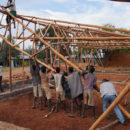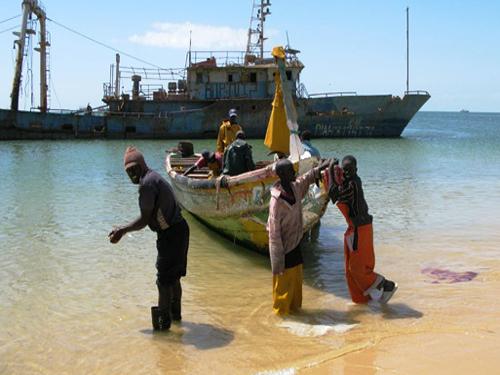After the Sudan-Chad Honeymoon: Why France Still Has to Worry
Another hypocrites’ handshake? It’s not the first time that Idriss Déby and Omar Al-Bashir, the presidents of Chad and Sudan, have embraced in front of the camera and the next day sent rebel groups against their respective capitals. Yet, whether these protagonists are sincere or not, the visit of Idriss Déby to Khartoum on 8-9 of February signifies a normalization which has in fact already started on the ground.
The two regimes have shown unusual goodwill in restraining the rebels of their respective neighbour, even if it is obvious that they can rapidly revive them. These benevolent messages have been followed by symbolic gestures: Bashir gradually moved the Chadian rebels some distance from the border (for that matter causing tensions among the populations of the zone in which they were subsequently stationed) and removed Gen. Salah Gosh from his position controlling them. In return Déby delivered, the ‘framework agreement’ and cessation of hostilities signed by the Justice and Equality Movement in February. The document, written in French, was signed in Chad by Dr Khalil Ibrahim and Dr Ghazi Salah-al-din on 20 February, just eleven days after Déby’s visit to Khartoum. First and foremost, this is no more than a footnote to the Chad-Sudan rapprochement, and an evidence of another more consequential agreement between Déby and Khalil.
As a second present to Bashir, Déby refused to renew the UN troop deployment in Eastern Chad (MINURCAT) which the Sudanese regime accuses of being a Western forward base for the potential invasion of Sudan. All things considered all this smacks of the most dispassionate pragmatism. MINURCAT and the European forces which preceded it, have not played the role which the Chadians had expected. To avoid compromising their neutrality, they refrained resisting rebel incursions. And above all, Déby had no need of MINURCAT to ward off the last raid of the UFR (now the principal rebel coalition) in May 2009.
This is the primary reason for appeasement: the military option failed, on both sides. The successive attacks of rebel groups in the two capitals were defeated. What is more, Déby and Bashir now have bigger issues to attend to, occupied by the elections this year in both countries and in Sudan’s case, the real prospect of Southern secession after the referendum of self-determination, scheduled to take place next year.
In Paris, this rapprochement should be the most heartening. Since the last failed rebel attack on N’Djamena in February 2008, France has made the improvement of Chadian-Sudanese relations its principal political focus in the region.
Doing so, Paris aligned itself with Déby, seeing Sudan as the essential cause of the Chadian problems(1), and above all refusing to hold inclusive negotiations including the Chadian government, the rebels and the legal opposition. However, this almost-unconditional support has not been given without collateral victims, beginning with Ibni Oumar Mahamat Saleh, main leader of the opposition, who disappeared after his arrest by Chadian forces during the fighting in February 2008. The two years of his disappearance provided the opportunity for French parliamentarians to ask some difficult questions, in particular concerning the fact that a French military doctor would have actually seen the body of the opposition leader.
Obviously, the Chadian-Sudanese rapprochement will not be enough to resolve all the contentious questions. The absence of a transition in power in Chad remains. Meanwhile Darfur is embroiled in internal conflicts (among rebel groups, between pro-governmental militia who have been gradually becoming more autonomous), about which the international community has little grasp. An agreement with JEM exclusively cannot solve Darfur’s conflict either.
Paris’s primary goal might have been more limited: to thaw Franco-Sudanese relations, which had been rendered glacial by French support to Déby, making France one of the favourite targets of the press in Khartoum. A return to the era where Paris had as good relations with Sudan as it has with Chad, could allow France to play a more active role in the resolution of conflict in Darfur. But these last few years it has not only been its political relationship with Chad which has damaged its relations with Sudan. The problems have accumulated. The most visible is the fact that Paris harbours rebel leader Abdel Wahid Mohamed Ahmed al-Nur, supported by the activists of the coalition Urgence Darfour, previously close to Bernard Kouchner.
The exiled leader is still very popular in the IDP camps, however his authority is in question among his own troops who resent him for keeping himself so distant from Darfur and above all, criticize his wait-and-see attitude and his systematic refusal to enter into negotiations. Paris supports the peace process, all the while harbouring a man whose chair in the talks remains conspicuously empty. Since the beginning of the year, Abdel Wahid’s loyalists and his internal opponents have been in conflict and the former have not hesitated to kill some their armed brothers when they became too critical. For now, the International Criminal Court has not seemed interested in this.
Even more than the presence of Abdel Wahid, it is actually the ICC which poisons Franco-Sudanese relations since the arrest warrant for Omar Al-Bashir was issued a year ago. Evidently Paris supports the ICC as an institution more than the very personal decisions of Luis Moreno-Ocampo. The prosecutor seems to have deviated from strictly legal gambits in order to play politics. His decision to aim, as he planned from the beginning, the most severe charges at the highest level (i.e. genocide, which for now has been rejected by the judges) would only have made sense if the charge had provoked internal dissension in Khartoum sufficient to remove Bashir from power.
But one year later Moreno-Ocampo has lost the bet. Bashir has known how to draw those around him closer and in the same way that he has taken things in hand again in relations with Chad, he intends to do the same with his internal politics, including Darfur. Moreno-Ocampo has also lost the second bet: he hoped to prove his neutrality by going for the heads of rebel groups, but the judges decided that he did not have enough evidence regarding the role of Bahar Idris Abu Garda, the former number two of JEM, during the attack on the African Union peacekeeping base in Haskanita in 2007.
Another of France’s handicaps is the fact that French humanitarians now seem particularly targeted in the region: three of them, including two kidnapped in the Central African Republic, are still detained in Darfur by an armed group which presents itself as pro-governmental. Even if the hope of ransom can be a motivator, one can question whether the semi-autonomous Janjaweed do not believe themselves authorized to take French hostages because of the cold between Paris and Khartoum.
The final problem coming from Darfur concerns less the Quai d’Orsay in its entirety, than Bernard Kouchner himself. Because the diplomatic choices of France have caused a misunderstanding between the minister and the activists of Urgence Darfour, beginning with his “˜friend’, the writer Bernard-Henri Lévy. Kouchner would has no leg to stand on in reproaching Lévy, for pointing out the gap between Kouchner the minister and Kouchner the activist, as he did in Le Point magazine in January 2010. But neither can we blame the minister for having adapted his activist ambitions in the context.
Visibly annoyed, Kouchner replied in enumerating French initiatives, positive or not, for Darfur. The problem is visibly not inaction, but maybe acting in too many different ways and with too many objectives. Obviously one cannot support a controversial regime (in this instance Chad) while presenting oneself as the mediator of a conflict in which this regime is involved. It is an equally difficult task to dispense or promote justice for one committed to a number of diplomatic and humanitarian initiatives. Finally, the realpolitik which France has supposedly adopted in Sudan, no matter how sensible it is, does not marry well with either the promotion of Kouchner’s old ideals (the “˜right to intervene’ and “˜responsibility to protect’), or with his own self-promotion.
(A French version of this post can be found at http://www.grotius.fr/node/623)
(1) See Jérí´me Tubiana, “˜Why Chad isn’t Darfur, and Darfur isn’t Rwanda’, London Review of Books, December 2009.







Dear Jerome,
You are 100% correct, this is the work of Idriss Deby with France looking over his shoulder. Why else would the document then be transported to Doha so that M. Djibril Bassole, the DGSE policeman, can win his plaudits too?
Dr Khalil Ibrahim missed his chance a year ago when he was alone in the sunlight. Today he is more dependent on Deby than ever. Of course Deby has kept some cards in reserve, with JEM still running around the eastern prefectures and possessing multiple arms that the FAT delivered just before the agreement. By signing the “exclusive” deal in front of the world’s cameras however, Dr Khalil has actually fatally overplayed his hand and passed the initiative to the other Darfur rebels. As you say, Abdel Wahid has also lost his chance by overplaying the politics of the empty seat, and Dr Tijani Seisei Ateem is poised to sweep up the remnants of the SLM.
Dr Ghazi Salah Aldin is doing just enough to keep Darfur distracted so that the elections can pass. Deby has kept the French off his back and now he needs General Gration to keep the Americans at bay for another twelve months. So far he has won every round with Gration with such skill that the good general doesn’t even know it. Let us see what cards Dr Ghazi has up his sleeve.
Great to see that some people in Western capitals are waking up and seeing that Sudanese politicians and Government are not the stereotype fools often seen in your articles ! This type of attitude has led to the world underestimating Sudan, and for that matter all Africa, and making costly mistakes which cost us much time and money. Now that things are going well without intervention, or minimum, please just watch and learn how we solve our own problems. Maybe you just might learn something from a 10,000 year old civilisation !!
generic cialis cialis alternative